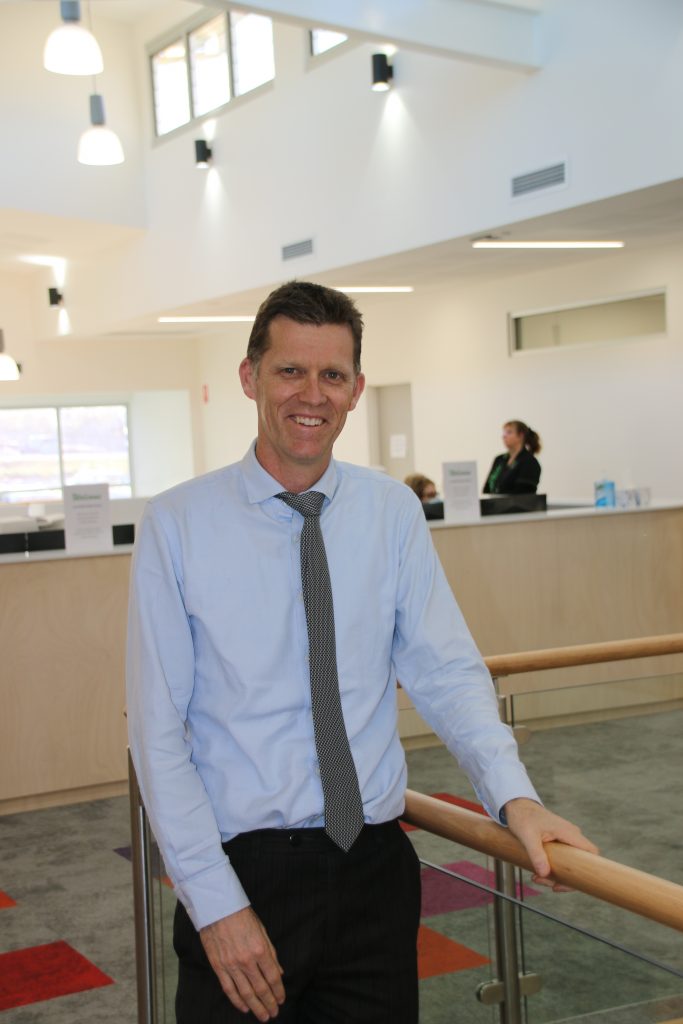Sector: Health and medicine
Address: 52 Ada Street, Cardiff NSW 2285
Environmental Upgrade: 73.80 kW solar grid connect system
Energy savings: Projected $27,000 per annum
Sustainability: Reduction of 84.5 tonnes of CO2 per annum
Problem
ATUNE Health Centres like to do things differently; ditching the cold atmosphere and sterile scent of traditional medical centres, their branch in Cardiff, New South Wales allows for natural light and plenty of air flow.
It’s a building that feels connected to the natural world. So it’s no surprise that ATUNE’s Founder and CEO, Simon Ashley, was interested in making his business more sustainable.
“Protecting the environment and having a place that is environmentally friendly is all part of our ethos,” he said. “People recognise that when they walk into our building; it doesn’t feel like a medical centre, the atmosphere and culture are different.”
He said the other significant factor that drew him to renewable energy was the exorbitant costs associated with running the centre; their electricity bills were projected to be between $85,000 and $90,000 a year – funds that could instead be used to benefit the centre’s clients.
Solution
Simon enlisted the help of an energy consultant, who revealed he could save between $20,000 and $30,000 a year by making the switch to solar energy.
He also suggested that Simon get in touch with Sustainable Australia Fund, to see how they could help; and Simon was delighted by what he found.
“I thought it was a great option! A normal bank wouldn’t give me a loan for a saving, so by going through Sustainable Australia Fund, I could access the money I couldn’t get any other way; they recognise the value in energy consumption reduction, and they also recognise that finance can sometimes be a problem.”
Process
Simon chose to access our Environmental Upgrade Finance, which was enabled by the Lake Macquarie City Council. By doing so, his upgrades became Sustainable Australia Fund’s debut project in New South Wales, as well as being the first project to be approved by this particular council.
Karen Partington – Lake Macquarie City Council’s Manager for Environmental Systems – said Lake Mac was one of over twelve council areas supporting Environmental Upgrade Finance in NSW.
“Whether it’s installing solar panels and electric vehicle charging stations, promoting water efficiency initiatives, replacing lighting or making other sustainability-driven improvements, Council’s involvement in the program helps businesses such as ATUNE reduce energy costs, support economic development and achieve sustainability goals,” Ms Partington said.
“If we can deliver a loan to help businesses move faster toward better environmental outcomes, then we are all for it. This program will streamline the process for significant modifications and upgrades to buildings across Lake Macquarie. That equates to dollars saved through cheaper energy, and flow-on environmental benefits.”
The funds were used to install a 73.80 kW solar grid connect system on the roof of the centre. Simon was also able to upgrade the centre’s hydro pool, which he said is 40 years old and “not very energy efficient.” This involved decommissioning its old services – the pumps, heater and some of the plumbing – and replacing them with new, energy efficient ones that will help him mitigate the cost of running it.
Yang Yang – an installer from HCB Solar – said that, for many businesses, investing in solar power is the most effective way to cut their electricity costs.
“Solar can help businesses reduce their electricity usage and can even bring their costs down to zero with enough solar power,” he said. “It’s also an easy way for businesses to reduce their carbon emissions and improve the environmental rating of the building.”
He also offered this advice for businesses beginning their solar journey:
“Solar is a crazy market where prices can fluctuate hugely between companies,” he said. “A bottom end product vs a top end product could mean up to a 50% difference in cost for the whole project. If a company is a lot more expensive, or a lot cheaper, find out why that’s the case; what are their inclusions, what are their differences?”
Outcome
Luckily for Simon, the centre is housed in a large building – with an enormous roof that’s perfect for solar panels. The final system is projected to save the centre $27,000 in electricity costs every year.
“We can almost pay off all our power through solar, through the size of the roof we have,” he said.
The system will also help the centre to dramatically reduce their carbon emissions by 84.5 tonnes of CO2 per year – the equivalent of taking 18 cars off the road. The pool upgrades will save the centre an additional 7.87 tonnes of CO2 per year, as well as 547.5 kilolitres of water per year – which rounds out to another saving of $4,000 per year
Needless to say, Simon is excited to see the cost of the centre’s electricity bill go down.
“It’s going to be a great reduction in our use of electricity, and therefore emissions to our community and region,” he said. “Most electricity is used by businesses, so if I can reduce our footprint, that’s certainly a big tick. There’s also the benefit that my outgoings for the building are, over time, going to be reduced, and that money can go towards helping our clients who need it, or anything that helps the business run better.”
Simon also had this advice to offer any businesses thinking about switching to solar:
“For me, it’s a no brainer; if you want to be able to save money, this is certainly a great way to go. But if you also want to show a more sustainable model as a business owner, then accessing funding like this gives you the ability to buy facilities for the benefit of your community – it’s a win-win.”

